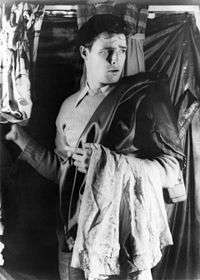Stanley Kowalski
Stanley Kowalski is a fictional character in Tennessee Williams' play A Streetcar Named Desire.[1]
| Stanley Kowalski | |
|---|---|
 Marlon Brando as Stanley Kowalski from the stage version of A Streetcar Named Desire (1948). | |
| First appearance | A Streetcar Named Desire |
| Created by | Tennessee Williams |
| Portrayed by | Marlon Brando Bonar Colleano Jack Palance Ralph Meeker Anthony Quinn James Farentino Aidan Quinn Treat Williams Alec Baldwin Blair Underwood Michael Arata John C. Reilly Stephon O'Neal Pettway Joel Edgerton Ricardo Antonio Chavira Rod Gilfry Teddy Tahu Rhodes August Costello Scott Sowers Alec Heriford |
| In-universe information | |
| Gender | Male |
| Spouse | Stella Kowalski |
| Children | A son |
| Relatives | Blanche DuBois (sister-in-law) |
In the play
Stanley lives in the working-class Faubourg Marigny neighborhood of New Orleans with his wife, Stella (born as Dubois), and is employed as a factory parts salesman. He was an Army engineer in World War II, having served as a Master Sergeant. He has a vicious temper, and fights often with his wife, leading to instances of domestic violence. Near the beginning of the play, Stanley announces that Stella is pregnant.
Stanley's life becomes more complicated when Stella's sister Blanche shows up at their door for a seemingly indefinite "visit". He resents the aristocratic Blanche, who derides him as an "ape", and often calls him a Polack. His resentment intensifies when Blanche starts dating his friend, Mitch, and lets Stella briefly take refuge with her after an argument in which he hits her.
Stanley starts asking questions of a street merchant who knew Blanche in her old life, and finds out that Blanche is staying with the Kowalskis because she is homeless; her family's ancestral mansion, Belle Reve, has been mortgaged. He also learns that she was paid to leave Mississippi to quell gossip about her many affairs, which she began after her husband, a closeted homosexual, committed suicide. Overjoyed to have the upper hand, Stanley tells Mitch about Blanche's past, which scares Mitch into ending the relationship.
The night that Stella gives birth to their son, Stanley goes out and gets drunk in celebration, and returns home; there, he finds a similarly drunk Blanche, lost in fantasies of better times. He makes a crude, drunken pass at her, which she rebuffs. Enraged, Stanley overpowers and rapes her. This final assault on what she had left of her dignity sends Blanche over the edge into a nervous breakdown. Weeks later, Stella has Blanche committed to a mental institution at Stanley's insistence. In the original play, Stella refuses to believe Blanche and stays with Stanley; in the 1951 film adaptation and many stagings of the play, however, she leaves him and takes their child.
Development
When developing the character, Williams frequently changed what Stanley's ethnicity would be. Originally the story was set in Chicago and he was written as an Italian American named Lucio.[2] Another draft, set in Atlanta, had the character named Ralph and be an Irish American.[3] In order the draft names were: Lucio, Stanley Landowski, Jack, Ralph, Ralph Stanley, and Ralph Kowalski, prior to the final one.[2]
No copies of the play drafts mention what Kowalski's line of work is. According to Zurawski, Stanley appears to be an office worker instead of a blue collar worker.[2]
Ethnic issues
Writer Caroline Golab, the author of "Stellaaaaaa . . . . . . !!!!!!!!: The Slavic Stereotype in American Film," argued that Kowalski was an offensive Polish American stereotype and that he was an auto mechanic.[2] Joseph W. Zurawski, author of "Out of Focus: The Polish American Image in Film," argued that Golab's analysis is not accurate.[4] Zurawski stated that Stanley identifies as American rather than Polish.[5]
In other media
He was most famously portrayed by Marlon Brando in the play's initial Broadway performance as well as the 1951 film adaptation. Since then he has been played by Treat Williams in the 1984 TV movie and by Alec Baldwin in the 1995 TV movie.[6]
References
- Zurawski, Joseph W. (Spring 2013). "Out of Focus: The Polish American Image in Film". Polish American Studies. University of Illinois Press/Polish American Historical Association. 70 (1): 5–35. doi:10.5406/poliamerstud.70.1.0005.
Notes
- Gussow, Mel (March 14, 1988). "Critic's Notebook; Has Stanley Kowalski Become an Unactable Role?". The New York Times. New York City: New York Times Company. Retrieved April 30, 2014.
- Zurawski, p. 8.
- Zurawski, p. 10.
- Zurawski, p. 8-10.
- Zurawski, p. 9.
- Rich, Frank (April 13, 1992). "Review/Theater: A Streetcar Named Desire; Alec Baldwin Does Battle With the Ghosts". The New York Times. New York City: New York Times Company. Retrieved April 30, 2014.